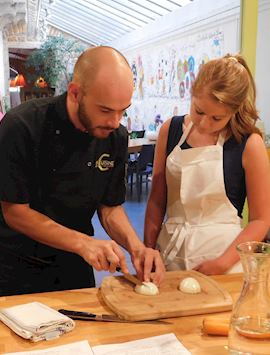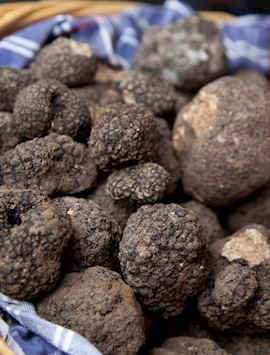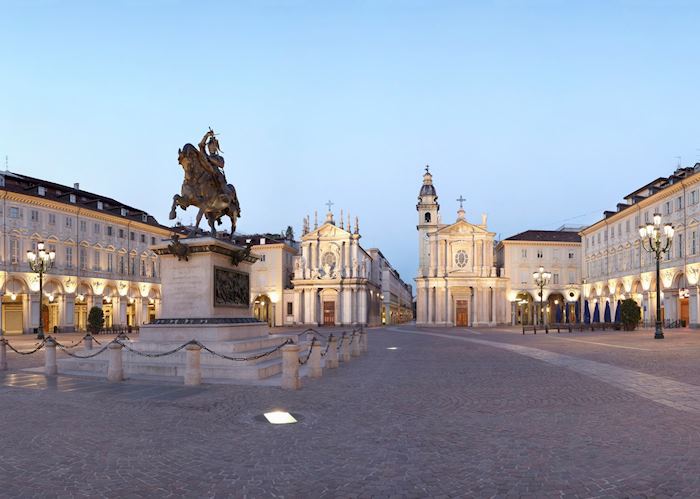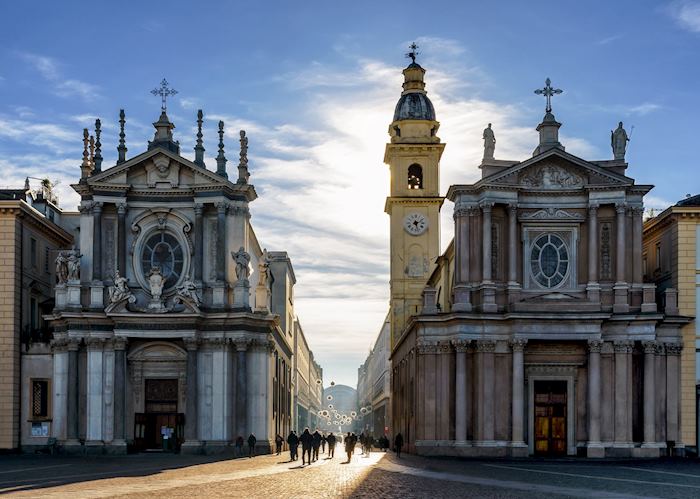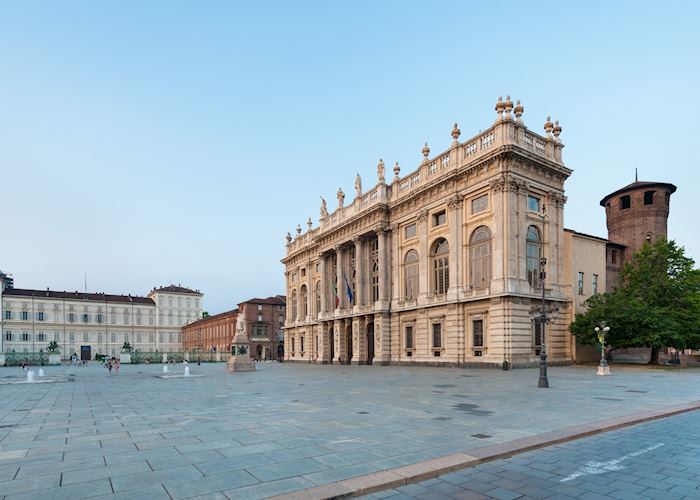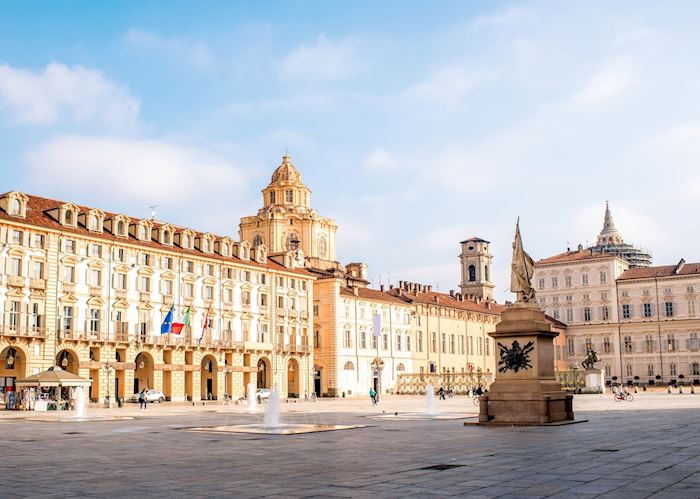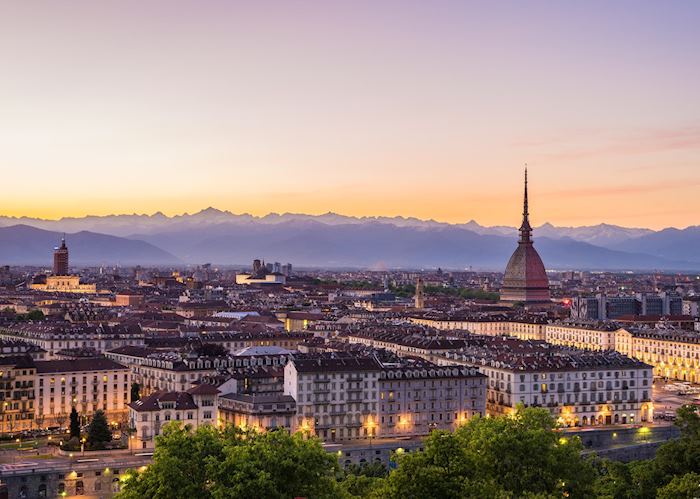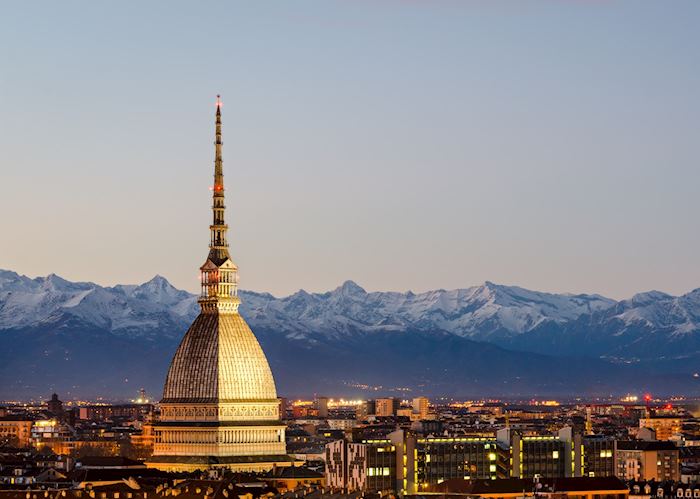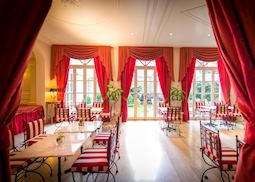Jump to:
A handsome city of wide boulevards, long arcaded walkways and grand piazzas, Turin is a cosmopolitan and self-possessed place, known for its fine food, many palaces and galleries, and industrial innovation. The city was the first capital of the unified Italy in the 19th century and the birthplace of Italian industry. It’s also the home of the venerated Holy Shroud of Turin. Overlooked by the Alps, Turin stretches along the banks of the Po River and has a slower pace of life than nearby Milan.
Italy specialist CarolineI love Turin and think it’s one of Italy’s most underrated cities. It’s not as busy as Rome, Florence or Venice, despite its wealth of Piedmont food and amazing architecture. It’s also the home of one of Italy’s best inventions, the aperitivo.
Things to see and do in Turin
Turin’s palaces
Capital of the Duchy of Savoy from 1563, Turin was a city of nobles. Between the 16th and 18th centuries, many of its public squares, palaces, castles and gardens were constructed. This collection of Renaissance, Baroque, Rococo and neoclassical architecture spreads across the heart of the city, making it an intriguing place to wander.
Among the many grand buildings on the imposing Piazza Castello, Turin’s central square, are the Palazzo Madama, the original seat of the Italian parliament, and the Palazzo Reale, a 17th-century royal palace. Napoleon occupied Turin in 1798, followed by the Austrians and Russians, putting an end to the city’s political ambitions.
Mole Antonelliana tower
In 1814, Vittorio Emanuele I restored the House of Savoy and Turin began to flourish again, albeit under the heavy influence of Austria. By 1861 his successor, Vittorio Emanuele II, had unified most of Italy and assembled the first parliament in Turin. The city’s political significance was short-lived, though, and the seat of government soon moved to Florence.
Shortly after, Turin’s most renowned landmark was constructed, the Mole Antonelliana, a 167 m (548 ft) tower that has become a symbol of the city. Completed in 1889, it was the tallest building in Europe at the time. Today, it provides panoramic views from its observation deck.
Fiat factory
Having given up on its political ambitions, Turin turned to industry to support its citizens and became Italy’s first major industrial hub. It’s Turin’s contribution to the motor industry that is most significant, with Fiat, Lancia and Ghia all based here.
The Fiat factory opened in 1899, with cars assembled from the ground floor up and the completed vehicle emerging onto the rooftop test track. The track was made famous by its appearance in the final scenes of the 1969 film The Italian Job, starring Michael Caine, and you can visit it as part of a factory tour.
Holy Shroud of Turin and the cathedral
Turin’s Renaissance duomo, officially called the Cattedrale di San Giovanni Battista, has been the protector of the Holy Shroud for four centuries. The cathedral attracts large numbers of visitors, who come to see the replica kept on permanent display near the main altar.
After taking a look around, you can make a visit to the nearby Museo della Sindone (Museum of the Holy Shroud). It offers a detailed picture of the scientific, spiritual and historical research over the last 500 years into the claims that the shroud was the burial wrapping of Jesus.
Arts and culture in Turin
Turin is known for its numerous museums, art galleries, opera houses and libraries, but it also has a large university population and a vibrant arts, cinema and music scene.
Many of the city’s museums and theaters cluster around Piazza Castello and Piazza Carignano at the heart of historic Turin. Among them are the Galleria Sabauda, which houses the Savoy collection of art, and the Museo Egizio, which hosts the largest collection of Egyptian antiquities outside Egypt. During the summer months, look out for outdoor concerts and performances at the Savoy palaces.
Turin’s gastronomy
With cafés, restaurants, enotecas (wine shops), gelaterias (ice-cream shops) and chocolate shops lining every street, Turin leaves you under no illusions about the importance of food and wine to its economy. This is the city where the first bars of hard chocolate were produced. It’s the home of Lavazza coffee and it was the birthplace of the Slow Food movement.
Championing local food, traditional ingredients, artisanal products and sustainable agriculture, Eataly in the suburb of Lingotto is a vast Slow Food hall-cum-market filled with specialist counters. Here, you can buy local produce, from breads and pasta to seafood, cheese and olives.
Best time to visit Turin
Turin makes a good destination at any time of year. May to October is warmer and drier, with the hottest weather in July and August. December is also a good time to visit, when a vast array of Christmas lights bedeck the city.
who's been there
-
617-223-4521617-223-4395
- Make an inquiry
Suggested itineraries featuring Turin
Our itineraries will give you suggestions for what is possible when you travel in Turin, and they showcase routes we know work particularly well. Treat them as inspiration, because your trip will be created uniquely by one of our specialists.
Places near Turin
- Piedmont less than 5 miles away
- Alba 31 miles away
- Barbaresco 31 miles away
- Barolo 35 miles away
- Stresa 70 miles away
- Verbania 73 miles away
- Genoa 77 miles away
- Milan 79 miles away
- Lake Maggiore 82 miles away
- Como 85 miles away
- Blevio 87 miles away
- Torno 89 miles away
- Laglio 90 miles away
- Portofino and Santa Margherita 92 miles away
- Lezzeno 95 miles away
- Tremezzo 97 miles away
- Bellagio 100 miles away
- Lake Como 103 miles away
- Cinque Terre 121 miles away
- Porto Venere 128 miles away
- Parma 131 miles away
- Forte dei Marmi 145 miles away
- Gardone Riviera 145 miles away
- Sirmione 145 miles away
- Lake Garda 149 miles away
- Modena 162 miles away
- Verona 163 miles away
- Pisa 164 miles away
- Madonna di Campiglio 172 miles away
- Bologna 184 miles away
- Florence 198 miles away
- San Gimignano 200 miles away
- Siena 218 miles away
- Dolomites 221 miles away
- Ravenna 227 miles away
- Venice 228 miles away
- Alta Badia 229 miles away
- Perugia 270 miles away
- Orvieto 275 miles away
- Umbria 281 miles away
- Assisi 282 miles away
- Costa Smeralda 288 miles away
Photos of Turin
Accommodation choices for Turin
We've selected a range of accommodation options for when you visit Turin. Our choices usually come recommended for their character, facilities and service or location. Our specialists always aim to suggest properties that match your preferences.
-
![NH Collection Torino Piazza Carlina, Turin]()
-
![Grand Hotel Sitea, Turin]()
Grand Hotel Sitea
Turin
Ideas for experiencing Turin
Our specialists seek out authentic ways to get to know the places that could feature in your trip. These activities reflect some of the experiences they've most enjoyed while visiting Turin, and which use the best local guides.
-
Historical walking tour of Turin ![San Carlo and Santa Cristina churches, Turin]()
Historical walking tour of Turin
Historical walking tour of Turin
Turin’s wealth of history is unfurled on this half-day walking tour with a private guide, who’ll help you discover its grandest architecture, explain the story of the Shroud of Turin, and offer a deeper insight into the city and its people.
View details


